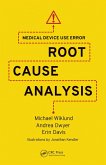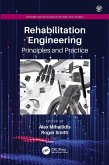This book offers practical guidance on how to methodically discover and explain the root cause of a use error-a mistake-that occurs when someone uses a medical device. From home-use products to devices used in clinical environments, the text presents case studies that show how root cause analysis leads from understanding a use error's causes and consequences to the development of design-based preventions. Using clear illustrations and simple narrative explanations, the text covers the fundamentals, language, and regulatory expectations of root cause analysis.
Dieser Download kann aus rechtlichen Gründen nur mit Rechnungsadresse in A, B, BG, CY, CZ, D, DK, EW, E, FIN, F, GR, HR, H, IRL, I, LT, L, LR, M, NL, PL, P, R, S, SLO, SK ausgeliefert werden.









